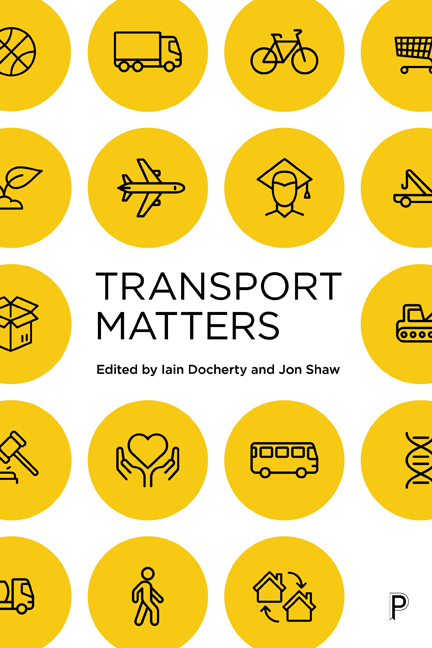12 - Remote, Rural and Island Communities
Published online by Cambridge University Press: 03 March 2021
Summary
Introduction
“The troubles of the rural buses really stem from the growth in the number of private motor cars now on our roads.”
“A lot of people who have the car are prepared to give a lift into the town on market days to their neighbours or friends.”
Assuming a favourable policy environment – and various chapters in this book have shown how in the UK this can never be taken for granted – journey makers in large towns and cities can have a range of different transport modes to choose from because population size and density creates sufficient demand to sustain them. In less densely populated areas, relative remoteness, journey distance and settlement size and distribution can combine to constrain journey-making options and increase journey-making time and cost. Sometimes people in rural areas have no option but to travel by car – either their own or someone else's – and, indeed, often they choose to even when alternatives are available. Car dependence and the cost and perceived unsuitability of public transport in meeting the accessibility needs of journey makers is often called the rural transport problem.
Transport matters in rural areas. In our most remote and peripheral communities, relying on the presence of lifeline services and the resilience of the transport system in often harsh environments, transport is typically the most salient local concern. Issues such as the condition of the trunk road, the absence or disappearance of bus services, the reliability of air services, the convenience of ferry timetables (or the ferries themselves) or the perceived deterioration of rail services are often highly politicised (Commission for Integrated Transport 2001). The two opening quotes illustrate important elements of the contemporary rural transport problem: the inability of public transport to provide a viable alternative to the car, reinforcing rural car dependence and, for those without direct access to a car, reinforcing a reliance on lifts from family, friends, neighbours and carers. The following quote hints at the tantalising prospect of technology and new forms of transport ownership, organisation and coordination providing the silver bullet(s) to help solve the problem: “There are a good number of new forms of transport coming into being with which we are not very familiar.”
- Type
- Chapter
- Information
- Transport Matters , pp. 279 - 300Publisher: Bristol University PressPrint publication year: 2019



